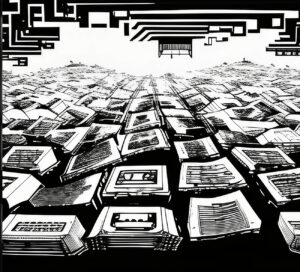Transparency in Charitable Donations
NFTs burst onto the scene like a bolt of lightning. The world couldn’t get enough of them, and they quickly became the talk of the town, turning the art and collectibles industry upside down. But NFTs weren’t content with merely shaking up the digital realm. They had much bigger plans.
These remarkable tokens held within them a promise, a promise to bring a new level of transparency and accountability even to the world of charitable donations. NFTs and blockchain technology go hand in hand, and when they come together, something extraordinary happens. NFTs become more than just unique pieces of digital art or collectibles. They become guardians of truth, keepers of trust, and enforcers of change.
By utilizing blockchain technology, NFTs can provide an immutable and auditable record of transactions, ensuring that philanthropic efforts are genuinely making a difference. This article explores the transformative power of NFTs in fostering transparency for donations and their potential to revolutionize the charitable sector.
The Trust Deficit in Charitable Donations
In the realm of philanthropy, a lingering challenge haunts the generous souls — the trust deficit. Donors often worry about the lack of transparency and accountability in how their contributions are utilized. The fear of funds going astray or being misused casts a shadow over the noble act of giving. NFTs can address these issues by offering a transparent and tamper-proof ledger of transactions.
Immutable Records and Traceability
NFTs, built on blockchain technology, enable the creation of a permanent and tamper-proof record of transactions. Each donation can be tokenized as an NFT, creating a unique digital asset symbolizing a contribution. And every step, from their creation to their final utilization, is traced with integrity. Donors can easily verify how their funds are being deployed, ensuring that they reach the intended beneficiaries.
Smart Contracts and Accountability
Smart contracts, a key feature of blockchain technology, can be utilized to automate and enforce transparency in charitable donations. Organizations can use these contracts to automate and enforce transparency. Conditions are set and must be met, ensuring that funds are released solely for their intended purpose. The power of smart contracts promotes accountability throughout the donation process.
Verification of Impact
NFTs offer a solution to the challenge of verifying the impact of charitable donations. By tokenizing specific projects or initiatives, organizations can assign unique NFTs to represent the outcomes or milestones achieved. Imagine an NFT as a sacred symbol of a school built, a well of pure water dug, or the healthcare provided. Donors can then track the progress and impact of their contributions by monitoring the associated NFTs.
Encouraging Donor Engagement
NFTs provide an opportunity to engage donors in a novel and exciting way. Limited-edition NFTs, exclusive experiences, and digital treasures can be used as tokens of appreciation. These digital gems hold not only inherent worth but also scarcity, enticing contributions and strengthening the bond between the giver and the cause.
Collaboration and Trust Building
The transparency facilitated by NFTs brings forth collaboration and trust between philanthropic organizations, donors, and beneficiaries. As all transactions and operations are recorded on the blockchain, it becomes easier to verify partnerships, track the flow of funds, and ensure efficient utilization of resources. This transparency can encourage collaboration, reduce duplication of efforts, and enable organizations to collectively work towards shared goals.
So, venture forth, dear reader, into this realm of transformation. Embrace the power of NFTs as they unravel the trust deficit, illuminating the path to a future where charitable donations flourish in a symphony of transparency, accountability, and collective goodwill.
Final Words
The potential of NFTs to transform the philanthropic landscape knows no bounds. By harnessing the power of blockchain technology, organizations can finally put an end to the trust deficit that has plagued the sector for far too long. With NFTs, every donation can be traced and verified, creating an immutable record of how contributions are being utilized. The automation of smart contracts means that funds are deployed for their intended purpose without the risk of human error or fraud. This level of accountability builds trust and confidence among donors, paving the way for a new era of giving.
The benefits of NFTs don’t stop there. These unique digital assets also allow for the verification of impact, giving donors tangible evidence of the positive change they’re helping to create. And with their engaging and interactive nature, NFTs provide a fun and exciting way to involve donors in the charitable process.





